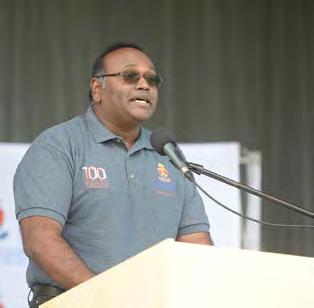
3 minute read
Remote Support during Online Assessment in the ‘War Room’ The Student Voice: Longitudinal Research into Student, Graduate
The ‘War Room’ in action during an online assessment in RUM 511: Mr Velly Nkosi (near left), the faculty’s instructional designer; Dr Rebone Moerane, HoD: Production Animal Studies; Ms Sandra Wilkinson (at the back), departmental administrator; Dr Takula Tshuma (seated, right), module coordinator for RUM 511; and Dr Martin van der Leek (standing), senior lecturer
At the opening ceremony, Dr Paul van Dam, Director of the OVAH, stated that: ‘Our undergraduate veterinary students are now exposed to a wider range of wild animals, not just with regard to diseases and treatment, but also in terms of feeding and overall management of the animals’. He noted the research opportunities into these animal species to promote improved support to the wildlife and conservation industries.
Professor Vinny Naidoo, the Dean of the Faculty, elaborated: ‘This facility also represents a new way of training veterinarians. I foresee that, through the skills that we will be able to develop and master in this new facility, we will make wildlife hospital care a common standard of care for the South African wildlife patient. It may be a dream, but not too far back, equine hospitals in South Africa were considered a non-reality, with many operations being undertaken on the grass. Yet today, we have well established equine hospitals in the country’.
Vice-Chancellor and Principal Professor Tawane Kupe added the following at the opening of the clinic: ‘The opening of this world-class facility that serves the wildlife sector and industry will be marked as a historic day for the Faculty of Veterinary Science of the University of Pretoria. The establishment of the new Wildlife Clinic also coincides with the faculty’s 100th year of existence, which to me is quite symbolic of our progress. I am proud of the expertise of our wildlife vets who have built a reputation for excellence worldwide. Not only are they called on for their expertise in wide-ranging areas, but our vets also play an important role in the conservation of endangered wildlife species’.
Remote Support during Online Assessment in the ‘War Room’
Staff and students raised concerns related to the implementation of online assessment during 2020. Students experienced increased anxiety caused in particular by connectivity issues. Lecturing staff were concerned about the reliability of online assessments compared to traditional invigilated assessments. As a result, the faculty created online assessment guidelines. The guidelines ensured the best possible assessment experience for students in clickUP, while maintaining the reliability of assessment under the somewhat different circumstances.
These guidelines included the need to synchronise online assessments to improve the faculty’s ability to monitor student access and progress during the assessments. The faculty therefore presented all semester tests on Friday mornings and opened an assessment for a limited time to ensure that all students started with the assessment at the same time. When Eskom announced load shedding during lockdown, this resulted in even more uncertainty, owing to the dependency on an uninterrupted power supply for access to the Internet, particularly in rural areas where a significant proportion of the faculty’s students were staying during lockdown. This required some assessments to start early in the morning when the electricity network and Internet were still relatively stable.
As part of the implementation of these guidelines, the faculty established a ‘War Room’ support structure on the Onderstepoort campus during the online assessments. The ‘War Room’ was attended by the faculty’s instructional designer, Mr Velly Nkosi, and their computer-based assessment support officer, Mr Mark Sias (from the Department for Education Innovation), as well as the IT laboratory manager, Mr Dewald Maartens, and the Deputy Dean: Teaching and Learning, Professor Dietmar Holm. Heads of departments, module coordinators and administrative staff were given the option to attend the ‘War Room’ face-toface or virtually. This strategy enabled staff to keep a close eye on student progress, and immediate support could be given to students even if this sometimes required a phone call to the student to resolve obstacles. The combined skills and proximity of the attending team were invaluable, especially during large assessments. The ‘War Room’ initiative proved to be a successful intervention to alleviate anxiety for students as well as lecturing staff. Everyone knew that there was a team of experts monitoring the assessment carefully and that they were able to make immediate decisions to ensure that the quality of assessment was maintained.










